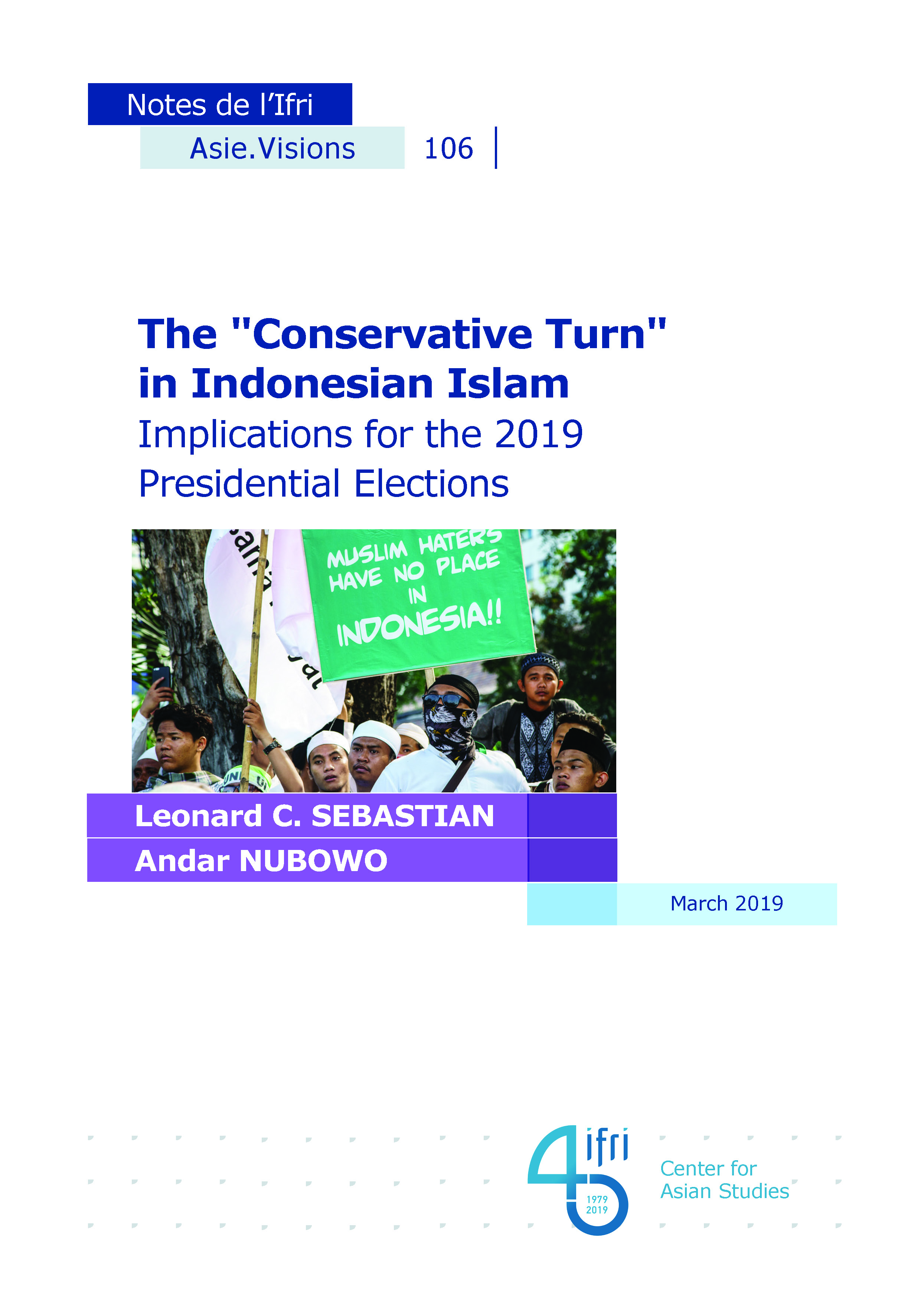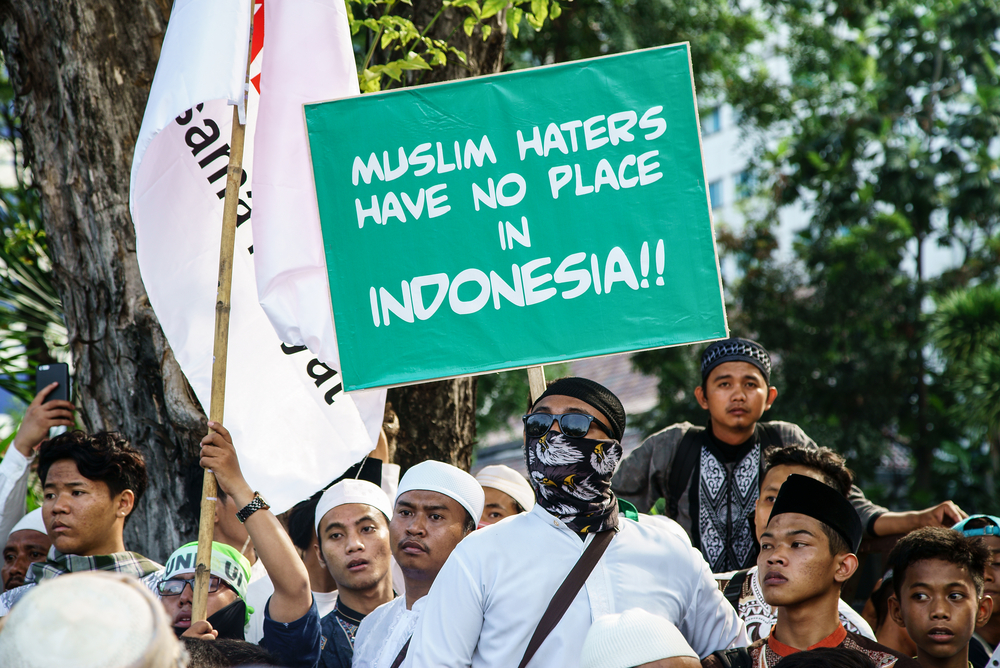The ‘Conservative Turn’ in Indonesian Islam: Implications for the 2019 Presidential Elections

Despite Indonesia’s reputation for a traditionally moderate brand of Islam, religious conservativism is gaining considerable political traction in the lead up to this April’s presidential election.

During the campaign for the 2017 Jakarta Gubernatorial elections, thousands of Muslims gathered in massive demonstrations against Ahok, the initial frontrunner and a candidate from a minority ethnicity and religion, accusing him of blasphemy. Many observers have looked at the unprecedented size of the anti-Ahok rallies and their electoral context as a watershed in the evolution of Indonesian Islam.
This article analyses the seismic shift in Indonesian Islam that has occurred, with moderate Islam in steep decline while conservative Islam is on the rise. It argues that radical Islam and violent extremism in Indonesia are only the tip of the iceberg—a resurgence of conservative Islamic ideology and large-scale Islamisation of Indonesian society has occurred over the nearly two-decade old Reform Era.
This conservative turn is powered by growing numbers of highly effective and nimble conservative groups and leaders that leverage on the star power of charismatic leaders and digital marketing to disseminate a conservative ideology to the millennial generation.
Ahok’s downfall was in many ways a product of this conservative turn. Religion and identity politics were certainly not the only factors involved—there were genuine socioeconomic grievances with Ahok’s policies—but the evidence suggests that religion played a decisive role in voting patterns. A new generation of Muslims who do not see a place for minorities in Indonesia has the potential to overturn centuries of harmonious and peaceful co-existence with dire consequences for democracy.
There has been a significant erosion of the ability of the two moderate Islamic organisations (Muhammadiyah and Nadhlatul Ulama - NU) to act as a bulwark against conservative Islam and exercise spiritual thought leadership in support of moderate Islam. As the two major forces of Islamic moderation in Indonesia, Muhammadiyah and NU should maintain their neutrality as Islamic civil societies, and should not become pseudo political parties. However, both of them also should not totally distance themselves from politics, as they could be applying an allocative politics toward all political forces, maintaining the same distance to all political forces. By holding fast to their basic foundation (khittah) consistently, it will become necessary for the two mass organisations to guard Indonesia’s future trajectory against the temptation of conservative groups to turn the 2019 presidential election (Pilpres) into an opportunity to push their religious and political agenda of shariatisation of the country.
The fact that Jokowi and Prabowo do not comprehend the dangers of how conservative discourse and agendas may lead them to be trapped in a political strategy that would lead Indonesia on a path of deepening Islamization of politics is a worrying trend.
Download the full analysis
This page contains only a summary of our work. If you would like to have access to all the information from our research on the subject, you can download the full version in PDF format.
The ‘Conservative Turn’ in Indonesian Islam: Implications for the 2019 Presidential Elections
Related centers and programs
Discover our other research centers and programsFind out more
Discover all our analysesJapan’s Takaichi Landslide: A New Face of Power
Prime Minister Sanae Takaichi has turned her exceptional popularity into a historic political victory. The snap elections of February 8 delivered an overwhelming majority for the Liberal Democratic Party (LDP), driven by strong support from young voters, drawn to her iconoclastic and dynamic image, and from conservative voters reassured by her vision of national assertiveness. This popularity lays the foundation for an ambitious strategy on both the domestic and international fronts.
The U.S. Policy Toward Taiwan Beyond Donald Trump: Mapping the American Stakeholders of U.S.-Taiwan Relations
Donald Trump’s return to the White House reintroduced acute uncertainty into the security commitment of the United States (U.S.) to Taiwan. Unlike President Joe Biden, who repeatedly stated the determination to defend Taiwan, President Trump refrains from commenting on the hypothetical U.S. response in the context of a cross-Strait crisis.

China’s Strategy Toward Pacific Island countries: Countering Taiwan and Western Influence
Over the past decade, China has deployed a diplomatic strategy toward the Pacific Island Countries (PICs). This strategy pursues two main objectives: countering Taiwan's diplomatic influence in the region and countering the influence of liberal democracies in what Beijing refers to as the "Global South."

Opening up the G7 to South Korea to Address Contemporary Global Challenges
The G7’s global influence has diminished as powers like China reshape international governance through initiatives such as BRICS and the Shanghai Cooperation Organisation (SCO). With the G7 now representing just 10 per cent of the world’s population and 28 per cent of global GDP, its relevance is increasingly questioned.










